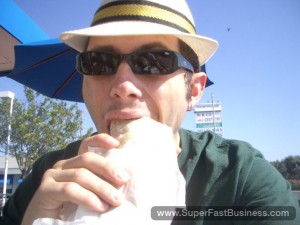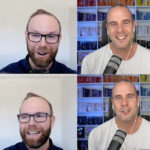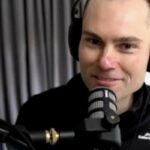Podcast: Download (Duration: 32:30 — 29.9MB)
Get Notified Of Future Episodes Apple Podcasts | Spotify | Amazon Music | Android | Blubrry | Gaana | TuneIn | Deezer | Anghami | RSS | More
At 9 am, Noah is still eating breakfast. He gamely entertains James’s interview, however. And how is James?
There’s been a 50% increase in sales revenue over the last two months, James shares. It’s been a good year.
And what does James attribute it to, Noah asks?
James credits the success to paying close attention to numbers, projections, and data analysis, alongside having an excellent team.
Noah resonates with this approach, mentioning an upcoming speech of his on focus, and the efforts in his own team to refocus, leading to improved results in his business.
Table of contents:
1. Focusing on the right thing
2. The 3 stages of a business
3. Getting the right people
4. From remote to working on location
5. How big is the company?
6. Do one thing well
7. Where Noah got his skills
8. Do you really need to track that?
9. On giving refunds
10.The competition
11. Which burrito?
Focusing on the right thing
It’s important, says Noah, to focus on the right objectives in business. He shares a personal experience where his company was overly focused on email metrics, hitting their goals but not experiencing business growth.
Realizing that they were targeting the wrong metric, they shifted their attention to the number of paying customers per day, which resulted in tangible growth.
How does one determine if they’re focusing on the right metrics, asks James? Especially in startup environments where growth is often prioritized?
Noah emphasizes the need to ensure a business is viable and profitable before focusing on growth. He expresses skepticism towards Silicon Valley startups that defer monetization. He prefers a more traditional approach that prioritizes creating value and generating revenue first.
James wants to challenge Noah’s “traditional” bent. How does he reconcile that with a fat suit logo and quirky branding?
Noah explains that AppSumo’s unique branding and customer approach is a by-product of people being themselves, rather than a deliberate marketing strategy. This authenticity has led to positive perceptions of their company.
Noah’s team must have quite a loose structure, says James, allowing for creativity and risk-taking, a divergence from typical bureaucratic styles.
The 3 stages of a business
Answering James’s question, Noah outlines his perspective on the three stages of a business, inspired by David Skok from forentrepreneurs.com.
The first stage is about validating the business, where the founder is deeply involved in every aspect, from micro-tasks to overarching decisions. This hands-on approach is critical for establishing the foundation and direction of the business.
In the second stage, the focus shifts to marketing the validated product or service. This phase involves strategizing on how to spread the word about the business, building on the initial success and proof that the product or service is valued by some people. Here, the business begins to expand beyond the founder’s direct involvement.
The third stage involves scaling the business aggressively (“taking it to the moon”).
Noah reflects on his own evolution through these stages, from being a one-person team handling everything, including menial tasks, to hiring people during the second stage. This transition also marked a shift in leadership style, moving from a more autocratic approach to empowering employees to make decisions.
The third stage, according to Noah, involves a shift in team dynamics, where the focus is on building a team of collaborators rather than just employees.
Getting the right people
Noah stresses the importance of hiring the right people for his business, particularly those who can maintain or improve the business while he is away.
This approach involves assessing the business upon returning from trips, say a week-long vacation in Australia, to evaluate whether the team has maintained or enhanced the business in his absence.
The strategy focuses on empowering employees, allowing them to make their own decisions and understand the company’s high-level goals. By giving employees autonomy and likening it to a football game where they decide how to score, Noah encourages creativity and independent problem-solving. This also enables him to focus on higher-level aspects of the business, reducing the need for micromanagement.
From remote to working on location
Does Noah go into the office everyday, asks James?
He does.
But it’s up to him, right?
Noah reflects on his previous experiences of running businesses and hiring people remotely. He noticed a significant increase in productivity and morale when his team gathered in person during team outings in Austin. This led him to decide that the AppSumo team would operate from the same location.
Noah initially set a requirement for the team to be in the office only on Mondays and Thursdays, giving them flexibility to work elsewhere on other days. He emphasized his results-driven approach, allowing team members the freedom to manage their own schedules as long as they achieved their goals.
Despite this flexibility, Noah found that both he and his team members enjoyed being in the office, fostering a collaborative and mission-driven environment. As a result, he ends up in the office five days a week, while still only requiring his team to come in twice a week.
James is surprised at Noah’s shift from a virtual to an in-person work setup, especially given Noah’s corporate background in companies like Facebook. He relates to the experience, though, noting the effectiveness of face-to-face interactions with his virtual team, although it’s not logistically ideal.
Noah talks of his past experience at Intel, contrasting the Monday morning dread he felt while working there with the enthusiasm he has for AppSumo. He believes that having the team in the same room adds seriousness and commitment to the work, challenging the notion of building a significant company entirely remotely.
No major company has succeeded while being entirely remote, says Noah, setting a benchmark of $25 million annual revenue as a measure of a significant company. James acknowledges this perspective, setting his own objective to reach half that revenue.
How big is the company?
Just how big is AppSumo?
Noah prefers not to disclose revenue figures, believing that focusing solely on financial metrics can misrepresent the company’s values and goals. More important, he believes, is impact, such as the size of their mailing list and the number of people positively affected by their services, which he finds more meaningful than mere financial success.
A key metric for the business, says Noah, is the number of paying customers, though he does not specify the exact number.
Do one thing well
Noah believes a business should focus on doing one thing exceptionally well rather than juggle multiple tasks poorly. He shares a story about Apple’s CEO, Tim Cook, who illustrated Apple’s success by showcasing a small number of key products on a table during an investor meeting.
This example struck Noah profoundly, reinforcing the idea that success can be achieved by concentrating on a few things and executing them excellently, rather than spreading efforts thinly across many areas.
James relates Noah’s perspective to Warren Buffett’s investment philosophy, which also favors focus and quality over quantity. Buffett’s approach involves minimal diversification in his stock portfolio, reflecting a belief in concentrating strengths rather than diluting them across too many ventures, which Noah finds analogous to his approach in business.
Where Noah got his skills
James recognizes Noah as a unique generalist, possessing a broad range of skills from research, sales copy, and design, to strategic planning, communication, networking, outsourcing, team management, data management, and analytics. It’s rare to find someone with such a comprehensive range of abilities in the business world. Where does Noah get his diverse skill set?
Noah attributes the development of his skills to a combination of influences from his family and his own experiences. He credits his stepfather, a programmer engineer, and his real father, a salesperson and entrepreneur, for laying the foundation of his diverse abilities.
Noah’s desire to create his own business and his fascination with the internet played significant roles in shaping his career path. His skills were further honed through various jobs, including sales roles and reading books by authors like Jeffrey Gitomer and Chet Holmes.
Noah’s abilities were also shaped by necessity and practical experiences, including learning programming at Facebook and during his education at Berkeley. He points to the importance of filling in gaps as needed, learning through failure, and experimentation.
Do you really need to track that?
In a previous business, Noah had the experience of tracking numerous metrics, only to realize that most of the data collected was not actionable and therefore not useful. This led to a shift in approach with AppSumo, where the focus is on tracking only actionable data. He emphasizes the importance of discernment in what to track, with the analogy of a composer who orchestrates various elements effectively.
Noah touches on the importance of recognizing both one’s strengths and limitations. He acknowledges his competence in programming but prefers to focus on areas where he excels, like marketing and sales, rather than investing time in skills that might not be as impactful for him. This perspective reflects a strategic approach to personal and professional development, focusing on areas with the greatest potential for impact.
James relates to Noah’s experiences and insights, drawing parallels to his own life and business.
His parents’ backgrounds—a chemical engineer father and a mother who was a communicator and empathetic problem solver—have influenced his own skill set and approach to business. His mother’s exceptional marketing and rapport-building skills with people have been particularly impactful.
On giving refunds
What’s Noah’s perspective on AppSumo’s generous refund policy? Do frivolous refund requests bother him? And is the policy a significant part of the business strategy?
Noah admits a personal reaction to the issue. The topic hits a sore spot, indicating
Noah references Dan Ariely’s “Predictably Irrational,” explaining the psychological impact of refund policies on customer satisfaction. A strict no-refund policy can make customers more content with their purchases, as they are committed to their decision. However, a lenient return policy can increase conversion rates despite potential misuse.
Noah faced a dilemma when a customer requested a significant refund, which led him to review the impact of refunds on the business. He discovered that, despite some abuses, the overall effect of the refund policy was positive.
Noah concludes that while some customers may exploit the refund system, overall, it is beneficial for the business. He views returns as an opportunity to create positive customer experiences and foster long-term loyalty. Noah’s stance is influenced by his positive perceptions of companies like REI and Costco, which have similar policies. This approach to refunds, despite its challenges, is seen as a strategic part of customer relations and business growth.
The competition
James wants to know how Noah deals with competition, and his feelings about copycat businesses like “AppClonesSumo.”
Noah reflects on his perception of success, noting that beyond a certain salary, additional money doesn’t significantly alter happiness or work satisfaction. He doesn’t see many true competitors, attributing this to his strong personal ‘why’—his drive to help others start businesses and improve careers, a passion that keeps him resilient and committed where others might quit at the first challenge.
At AppSumo, they approach business seriously, differentiating themselves from competitors. While some competitors are around, Noah believes that their lack of commitment sets AppSumo apart. He emphasizes that AppSumo is not just a daily deal site but a professional store, aiming to be a significant destination in the market. He sees the daily deal aspect as merely a sales medium, not the core of their business, a nuance he feels competitors often miss.
Noah actually expresses a desire for more competition, believing it would drive them to improve further. He shares his personal motivation strategy of setting competitive goals, even in everyday situations like jogging. Drawing parallels to his time at Facebook and the rivalry with MySpace, he highlights the motivational power of competition.
Noah believes being number one is challenging due to the risk of complacency, whereas being number two offers more freedom to innovate and understand the market leader’s strategies. This underlines the importance of continuous evolution and striving for improvement in business.
Which burrito?
In a burrito bar, poses James, would Noah get the same burrito every time, knowing it’s awesome, or would he try different options on the chance of getting something better, knowing he also risks it not being as good?
Noah refers to the ‘Paradox of Choice,’ a book whose author suggests too many options can decrease happiness. This author chooses the same dish at restaurants to avoid the stress of decision-making. This allows him to focus his mental energy on other, more important aspects of his life.
Noah likens this to broader life choices, using the metaphor of marriage to illustrate commitment and satisfaction with one’s choices. He too prefers to stick with what he knows works well, both in terms of food and life decisions. This mindset helps him avoid the mental burden of constantly evaluating alternatives.
James has to share before wrapping up, as an unsubscriber from AppSumo, he actually made a few purchases after Noah provided him an RSS feed.
Noah believes in valuing every customer. While some customers might need to be let go, like one who returned $2000 worth of products, it’s crucial to remain attentive to customer needs.
Noah mentions his decision to hire an executive coach. He recalls Mark Zuckerberg’s use of a coach at Facebook and acknowledges the potential benefits of having guidance in professional and personal development. This openness to new experiences and learning, Noah suggests, is key to growth and improvement, both for individuals and businesses. He might tell James all about it in another podcast.
Liked the show? Leave us a review on iTunes











Great Stuff!!!
I just found your podcast a few days ago and have listened to about half of them. This is one of my favorites. Keep up the good work.
I just found your podcast a few days ago and have listened to about half of them. This is one of my favorites. Keep up the good work.
thank you !